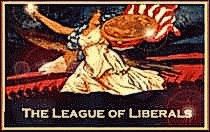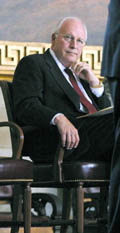 Senators vote to allow Dick Cheney to keep ill-gotten Halliburton half-million.
Senators vote to allow Dick Cheney to keep ill-gotten Halliburton half-million.
Vote validates Halliburton financial ties to Cheney and the Senates self serving proclivity to keep Senators and VP in profits.
The Senate rejected efforts on Tuesday to keep Vice President Dick Cheney from collecting $500,000 that he is scheduled to receive from Halliburton Corp. this year. By a vote of 65 to 34, the Senate voted to set aside an amendment that would have prevented Cheney, who led the Houston-based energy firm from 1995 to 2000, from receiving the deferred compensation. It also would have forced the former Wyoming congressman to sell 400,000 options to buy stock in the firm.
The amendment was part of a multi-pronged attack by Democrats against Halliburton and Cheney, who represented Wyoming from 1979 to 1989. Rep. Henry Waxman, D-Calif., sent a letter to the Bush administration this week in which he charged that Halliburton was manipulating the price of exported Iraqi oil. Sen. Frank Lautenberg, D-N.J., tried to attach the amendment to a bill, S 1689, that would provide $87 billion to fund military operations in Iraq and Afghanistan, and to rebuild Iraq. The proposal includes $65.6 billion in military funding and $20.3 billion for the reconstruction of Iraq.
The Senate never actually voted on the amendment, but rather voted on whether to continue debating the issue. Lautenberg was disappointed that a majority of his fellow senators voted to set aside his amendment. "What we were asking is that if a high ranking official has a financial interest in a company that company should not be allowed to get contracts that benefit that high ranking official," Lautenberg said. "It's pretty simple and obvious."
Sen. Mike Enzi, R-Wyo., and other Republicans leapt to Cheney's defense. Enzi was furious that the amendment was clearly directed at the vice president. "I think it is pure politics," Enzi said while standing in a hallway a few feet from the Senate floor. "It was the worst personal attack on an individual that I have seen since I have been a member of the Senate." Enzi, who was a member of the Senate during the effort to impeach President Bill Clinton, was equally vehement in his criticism during a speech on the Senate floor.
"This (amendment) tries to take a 'stealth' approach to the matter, but in fact, its real purpose is pretty obvious," Enzi said. "I don't think anyone will be fooled by it because we all know who it is directed against. Back in my home state of Wyoming, a lot of people who know Dick Cheney will be surprised to see the Senate using its valuable time in what some might see as a witch hunt against the vice president."
Enzi noted that Cheney has put his assets in a blind trust, which means that he has handed over the day-to-day management of them to someone else. He also noted that Cheney has promised to donate after-tax proceeds from the exercise of his Halliburton stock options to the Capital Partners for Education, the George Washington University Medical Facility Associates and the University of Wyoming.
"No serious minded individual who belongs to any political party really believes this amendment is necessary or needed," Enzi said. "It must be withdrawn and an apology extended to both the vice president and the president for its promotion." Lautenberg neither withdrew the amendment nor proffered an apology.
Lautenberg was a successful businessman before being elected to the Senate in 1982. He retired in 2000, but chose to run again in 2002 after the Democratic incumbent Robert Torricelli chose not to run again because of a financial scandal. Lautenberg, whose father was a immigrant silk mill worker, transformed his company, Automatic Data Processing, from a three-man business into a world leader in processing paychecks.
When asked if he was afraid that his amendment would prevent business men like him from entering politics or devoting their efforts to public service, Lautenberg responded: "When I got here I learned an old adage: 'If you want to make a small fortune, come to Washington with a big fortune.'" Although the amendment was set aside, the Democratic attacks on Cheney and Halliburton are likely to continue.


 Contact
Contact  The Republican Congress and Senate may buy it but the world does not. Other nations are not blind to what is happening here and in IRAQ where obscene amount of money are being ripped off by Bush cronies and Cheney's Halliburton.
The Republican Congress and Senate may buy it but the world does not. Other nations are not blind to what is happening here and in IRAQ where obscene amount of money are being ripped off by Bush cronies and Cheney's Halliburton.
